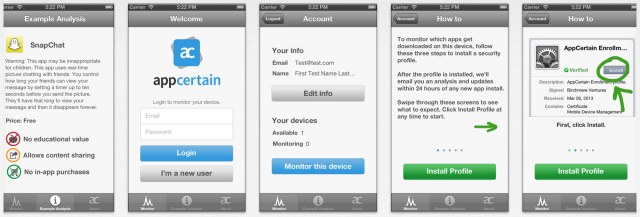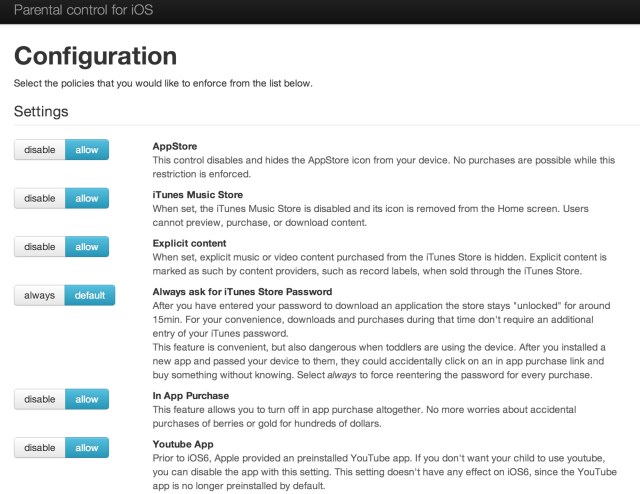In the interest of protecting children, a new iOS application called AppCertain has debuted a monitoring application aimed at parents. The app, whose goal is to alert parents about the nature of the applications their kids are downloading, involves the use of a “configuration profile” – special software Apple originally intended for enterprise use, not consumer-facing apps sold through its App Store marketplace.
But Apple reviewed the application – for longer than most, founder and CEO Spencer Whitman tells us – and subsequently approved it. For how long that will remain the case, however, is unknown.
“We think we are on a gray line with respect to Apple, but we don’t really know,” Whitman admits.
Configuration profiles, for those unfamiliar, were designed for the enterprise environment, allowing I.T. departments to manage the iPhones and iPads used by a company’s employees. They’re typically employed by Mobile Device Management solutions which use the software to configure, track and/or restrict a number of system-level settings like Wi-Fi, VPNs, app settings, permissions, and more.
But more recently, a handful of startups have started using these same profiles to work around Apple’s App Store’s restrictions in order to accomplish tasks which wouldn’t otherwise be possible. Apple is aware this is happening, and seems to be handling each app submission on a one-off basis for now.
We’ve seen mobile data compression utilities like Onavo and Snappli take advantage of the technology to intercept, re-route, and compress web data in order to save users’ bandwidth, for instance. Social search engine Wajam also uses a configuration profile to inject its own search results into Safari, though this is done outside of the Apple App Store.
Onavo is still live on the Apple App Store today, though Snappli has since disappeared. (We reached out to the company for details, but have yet to hear back. It’s possible that Apple simply didn’t care for the fact that Snappli had publicly shared data showing how iOS users were dumping the then newly-launched Apple Maps application.)
But frankly, it seems odd that Apple would knowingly ever let these types of applications into its consumer-facing app store in the first place, given the security risks they could pose. If used unscrupulously, a malicious configuration profile could remote control a user’s device, manipulate user activity, and hijack their sessions, or so explained security researchers at Skycure back in March.
AppCertain isn’t a malicious developer, though, and its intentions are not to control or restrict how an Apple device is used, which would then be stepping on top of Apple’s own, built-in Parental Control features. Instead, it only monitors app downloads and reports back to parents via email that an app was downloaded, explaining what the app does, as well as what sorts of permissions it requests, and more.
The idea is to alert parents about the apps their child uses, including whether or not they have educational value. It doesn’t prevent the child from actually downloading or installing apps.
The service, staffed by a number of Carnegie Mellon University alumni, first launched to the web in February after being incubated by seed and studio fund Birchmere Labs.
Whitman explained at the time that the company wanted to help busy parents, who often have a hard time keeping up with what their children are installing and using. It’s not only a problem that affects tech novices, he had said. Even savvy parents often forget or get too busy to keep a close eye on their children’s devices. And these devices, little mini-computers that they are, are not without risks.
Parental Controls Outside Of Apple’s Control
While AppCertain is trying to go the official, Apple-approved route with its creation, another company, a small German app consultancy called Mocava, is not. Its new Parental Control application is an over-the-air install only, knowing that Apple would never approve it for App Store download.
Mocava owner Vinh Phuc Dinh says that he created the app to address a situation he found himself in all the time. “I have many nephews, and would pass on my device for them to play,” he tells us. “Unfortunately, there is no easy way to restrict access on the iPhone and save the desired preferences. So we built it ourselves.”
What he means is that though Apple offers parental control features, it’s not the right solution for those who only need controls on occasion. With his Parental Control App, you can quickly turn on restrictions without having to reconfigure them from scratch them each time you hand your phone or iPad to a child. Even if Apple’s restrictions are turned off, the tool will remember your settings.
You can restrict certain default apps from being accessed or certain content from being viewed. You can disable in-app purchases, or specify that an App Store password is always required, and more. To get started, you configure your settings on the web, then download the profile the company provides.
The mere fact that this app and AppCertain even exist speaks to one of the problems with Apple’s strict control over its OS. Unlike on Android where apps like KIDO’Z, Kytephone, Play Safe, Kid Mode and others allow parents more granular control and insight, Apple’s settings are cumbersome. If you turn on age restrictions, for example, the child can’t watch Netflix. You can disable the web browser, but not whitelist websites, and so on.
These devices are computers, and while parents may disagree on what level of involvement on their part is necessary, it’s fair to say that as with “real” computers, children – especially young children – shouldn’t be given free rein with no parental oversight. Too many parents think of iPads as toys, blindly typing in their password every time their kid begs for a new app. They, perhaps, put too much trust in Apple’s “family friendly” policies – just because apps are rated and ranked, pornography or gore-free, that doesn’t make everything appropriate for every child.
It will be interesting to see how far Apple allows these companies to push into this new territory, before it decides to crack down or otherwise change its policies.
AppCertain is available for download here on iPhone and iPad.


